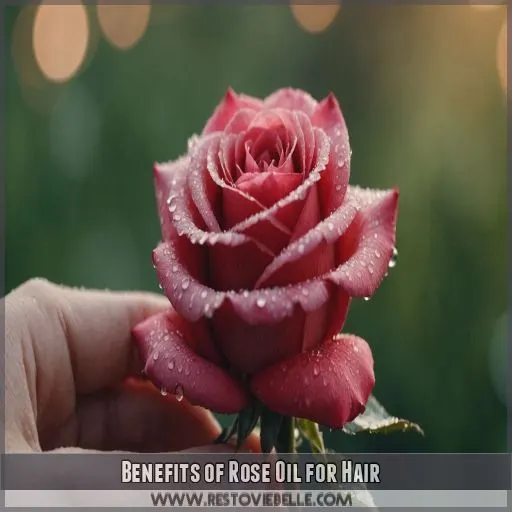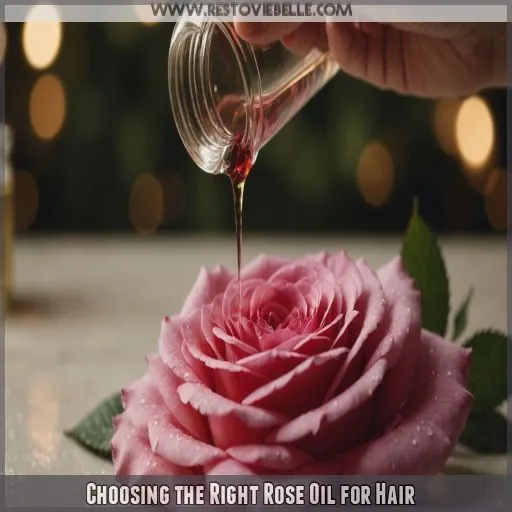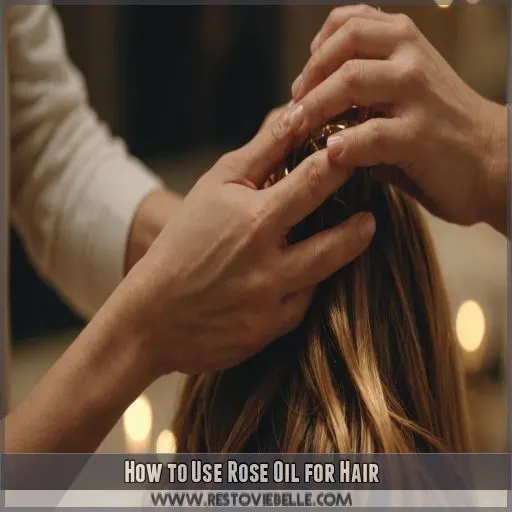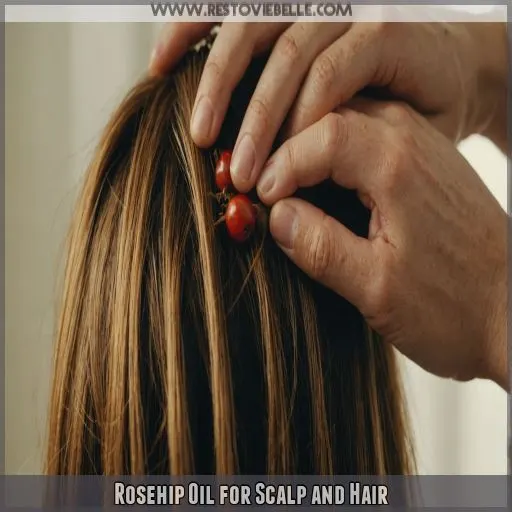This site is supported by our readers. We may earn a commission, at no cost to you, if you purchase through links.
 You’re probably wondering if rose oil for hair is the secret to achieving those silky, vibrant strands you’ve always envied.
You’re probably wondering if rose oil for hair is the secret to achieving those silky, vibrant strands you’ve always envied.
Well, you’re on the right track!
Rose oil can strengthen hair follicles, soothe a cranky scalp, and even promote new growth.
But, before you start slathering it on, remember to dilute it with a carrier oil – we don’t want any irritation or allergic reactions!
By incorporating rose oil into your hair care routine, you’ll be rocking healthy, gorgeous hair in no time.
And, trust us, there’s more to it than just a pretty scent…
Table Of Contents
- Key Takeaways
- Benefits of Rose Oil for Hair
- Choosing the Right Rose Oil for Hair
- How to Use Rose Oil for Hair
- Rosehip Oil for Scalp and Hair
- Safety Precautions and Side Effects
- Frequently Asked Questions (FAQs)
- Does rose oil good for hair?
- Is rose good for hair growth?
- What are the benefits of rose oil?
- How long to leave rosehip oil on hair?
- Can rose oil be used on colored or chemically treated hair?
- Does rose oil help with detangling and managing curly hair?
- Can rose oil be used as a heat protectant for hair?
- How does rose oil compare to other hair oils like argan oil?
- Can rose oil be used to treat hair loss due to stress?
- Conclusion
Key Takeaways
- You’re on the right track with rose oil for hair – it can strengthen your hair follicles, soothe a cranky scalp, and even promote new growth, but remember to dilute it with a carrier oil to avoid irritation or allergic reactions!
- Massaging rose oil into your scalp can be a game-changer for hair growth, as it reduces breakage and hair loss, and supports the hair growth cycle – it’s like giving your hair a reboot, empowering it to grow stronger and more resilient.
- Rose oil is like a drink of water for your locks, providing long-lasting moisture to dry hair, and its antiseptic properties are like a deep clean for your scalp, removing dirt and bacteria that can clog hair follicles and lead to dandruff.
- When choosing the right rose oil for your hair, consider your hair type – if you have fine hair or an oily scalp, use rose oil sparingly, while curly hair can benefit from Rosehip Oil to define curls and reduce frizz, and color-treated hair can benefit from rose oil’s moisturizing properties to lock in color and hydration.
Benefits of Rose Oil for Hair
You’re about to discover the incredible benefits of rose oil for your hair – from strengthening follicles to soothing an itchy scalp, and even promoting new growth. Whether you’re dealing with dryness, damage, or just want to give your locks a little extra love, rose oil is about to become your new BFF.
Strengthens Hair Follicles
Want to give your hair a fighting chance? Massaging rose oil into your scalp can strengthen hair follicles, reducing breakage and hair loss. By nourishing your scalp, you’re supporting the hair growth cycle and promoting healthy locks. It’s like giving your hair a reboot, empowering it to grow stronger and more resilient – and who doesn’t want that?
Soothes the Scalp
A soothed scalp is just a few drops away! Rose oil’s anti-microbial properties help calm dry, irritated, and inflamed scalps, making it a game-changer for dandruff treatment. By reducing scalp irritation, you’ll be saying goodbye to that itchy scalp and hello to a healthier, happier scalp. Rosehip oil, in particular, has shown promise in tackling inflammatory scalp conditions.
Removes Dirt and Bacteria
Let’s get real – a healthy scalp is key to fabulous hair! Rose oil’s antiseptic properties are like a deep clean for your scalp, removing dirt and bacteria that can clog hair follicles and lead to dandruff. By incorporating rose oil into your hair care routine, you’ll be promoting scalp hygiene and hair follicle health – naturally!
Moisturises Hair
Now that we’ve tackled the dirt and bacteria, let’s talk hydration! Rose oil is like a drink of water for your locks, providing long-lasting moisture to dry hair. Use it as a pre-shampoo treatment or add it to your hair mask for an intense dose of hydration. Your scalp (and hair) will thank you!
Promotes New Growth
Boosting hair growth is a top priority for many of us! Rose oil can help by creating a healthy environment for your locks to thrive. Here are three ways it promotes new growth:
- Supports scalp health: Rose oil’s antiseptic properties keep your scalp clean and free of bacteria.
- Reduces hair loss: By strengthening hair follicles, rose oil helps prevent breakage and shedding.
- Balances DHT levels: Rose oil may help regulate DHT, a hormone that can contribute to hair loss.
Choosing the Right Rose Oil for Hair
You’re ready to harness the power of rose oil for your locks, but with two popular options – wild rose oil and rosehip oil – you’re wondering which one is right for you. Let’s break down the differences and benefits of each to help you choose the perfect rose oil for your hair type and needs.
Wild Rose Oil Vs Rosehip Oil
If you’re thinking about using rose oil for your hair, you’ve got two main options: wild rose oil and rosehip oil. Both have their own perks, but which one is right for you? Here’s a quick rundown:
| Benefits | Wild Rose Oil | Rosehip Oil |
|---|---|---|
| Strengthens hair follicles | ||
| Moisturizes scalp | ||
| Antimicrobial properties | ||
| Hydrates hair |
Choose wild rose oil for its antiseptic qualities and hair follicle strengthening abilities. Opt for rosehip oil for its moisturizing effects and potential to combat inflammatory scalp conditions. Think about your hair goals and pick the right rose oil for you!
Hair Type Considerations
When choosing the right rose oil for your hair, consider your hair type. Not all hair is created equal, and what works for one person mightn’t work for another. Here are three things to keep in mind:
- If you have fine hair or an oily scalp, use rose oil sparingly to avoid greasy hair.
- For curly hair, rosehip oil can help define curls and reduce frizz.
- Color-treated hair can benefit from rose oil’s moisturizing properties to lock in color and hydration.
Benefits for Dry or Damaged Hair
If you’re dealing with dry or damaged hair, rose oil is a game-changer! Its emollient properties help lock in moisture, reducing frizz and flyaways. Use wild rose oil or rosehip oil to repair split ends, prevent breakage, and add shine to your locks. Mix a few drops with a carrier oil for a pre-shampoo treatment or hair mask.
Benefits for Inflammatory Scalp Conditions
Dealing with inflammatory scalp conditions like dermatitis, psoriasis, or rosacea can be frustrating. Rose oil, particularly rosehip oil, may offer relief due to its anti-inflammatory and antimicrobial properties. Here are some benefits you can expect:
- Reduces inflammation and soothes the scalp
- Moisturizes and calms dry, itchy skin
- May help promote healthier hair growth
How to Use Rose Oil for Hair
You’re now ready to harness the power of rose oil for your locks – let’s get started with the fun part: incorporating it into your hair care routine. In this section, we’ll break down the simple and effective ways to use rose oil for hair, from diluting it with carrier oils to creating a nourishing scalp massage oil.
Diluting With Carrier Oils
When using rose oil for hair, it’s important to dilute it with a carrier oil to avoid irritation. Choose from argan, jojoba, coconut, or almond oil, and mix 5-10 drops of rose oil with 1-2 tablespoons of carrier oil. This will help you apply it safely and effectively. Start with a small patch test to check for any sensitivity.
Adding to Shampoo or Conditioner
Now that you know how to dilute rose oil with carrier oils, let’s talk about adding it to your shampoo or conditioner.
Start with a small amount (about 5-7 drops) and mix it with your regular shampoo or conditioner.
Use it 1-2 times a week, depending on your hair type and needs.
Look for gentle, sulfate-free shampoos and conditioners for best results.
Pre-Shampoo Treatment With Rose Oil
You’re ready to try the pre-shampoo treatment powers of rose oil. Before washing, mix rose oil with a carrier oil like argan or coconut oil for a hydrating boost. Here’s how:
- Mix 5-7 drops of rose oil with 2 tablespoons of carrier oil.
- Apply the blend to your hair, focusing on the ends.
- Leave it on for 30 minutes to an hour before shampooing.
Creating a Scalp Massage Oil
Now that you’ve mastered the pre-shampoo treatment, let’s get hands-on with creating a scalp massage oil. Mix a few drops of wild rose oil with a carrier oil like argan or jojoba, and gently massage it into your scalp. This DIY recipe promotes scalp health, reduces tension, and leaves your locks feeling silky smooth.
Using Rose Oil as a Hair Mask
Now that you’ve got your scalp massage oil, let’s talk about using rose oil as a hair mask. Here are three ways to do it:
- Rose oil and coconut oil mask: Mix equal parts rose oil and coconut oil for a hydrating treat.
- Rose oil and honey mask: Combine rose oil with honey for a soothing, sweet treatment.
- Rose oil and avocado mask: Blend rose oil with mashed avocado for a creamy, nourishing mask.
Rosehip Oil for Scalp and Hair
You’re probably wondering how rosehip oil can help your scalp and hair.
It’s packed with anti-inflammatory and antimicrobial properties that may soothe an itchy scalp and promote healthier hair growth.
By incorporating rosehip oil into your hair care routine, you may be able to tackle issues like dandruff, psoriasis, and rosacea.
You may also be able to strengthen your hair roots and lock in moisture.
Anti-Inflammatory Properties
Let’s talk about rosehip oil’s anti-inflammatory properties and how they can soothe your scalp. If you’re dealing with conditions like psoriasis, dermatitis, or rosacea, this natural remedy might be just what you need.
| Scalp Condition | How Rosehip Oil Helps |
|---|---|
| Psoriasis | Reduces inflammation, promoting healthy skin cell growth |
| Dermatitis | Soothes itchy, irritated skin with its anti-inflammatory properties |
| Rosacea | Calms redness and reduces inflammation, providing relief |
Antimicrobial Properties
Let’s explore rosehip oil’s antimicrobial properties, your new BFF in the fight against scalp infections. Here are four ways rosehip oil’s got your back:
- Bacteria control: Rosehip oil’s antimicrobial properties help keep bacteria in check, promoting a healthy scalp.
- Fights fungi: It also combats fungi, another common scalp foe.
- Soothes irritation: Rosehip oil calms irritated scalps, reducing inflammation.
- Prevents infections: Its antimicrobial powers prevent infections, keeping your scalp healthy and happy.
Moisturizing Effects on the Scalp
Got a dry, itchy scalp? Rosehip oil’s got your back! With its moisturizing properties, it helps lock in hydration and soothe irritation. Rich in linoleic acid, vitamin A, and vitamin C, it’s a natural scalp moisturizer that’ll leave you feeling calm and in control. Mix it with a carrier oil for the ultimate dry scalp remedy.
Potential Benefits for Hair Growth
If you’re looking for ways to boost hair growth, you might be interested in trying rosehip oil. While it’s not a miracle cure, it shows some promise. Here are 4 potential benefits:
- Antioxidant-rich: Rosehip oil’s high antioxidant content may help protect your hair follicles from damage.
- Fatty acid boost: Its fatty acids may nourish and strengthen your hair.
- Scalp soothing: Rosehip oil’s anti-inflammatory properties may calm an irritated scalp.
- Hair growth promotion: Some users claim it promotes hair growth, although more scientific studies are needed to confirm this.
Using Rosehip Oil for Inflammatory Scalp Conditions
Now that we’ve explored rosehip oil’s potential benefits for hair growth, let’s talk about using it for inflammatory scalp conditions like dermatitis, psoriasis, and rosacea. Before using rosehip oil, consult a doctor and discuss it as a complementary therapy. Always patch test to avoid allergic reactions, and start with a small amount to gauge your scalp’s sensitivity.
Safety Precautions and Side Effects
As you start using rose oil for hair, remember that with great benefits come some precautions to watch out for. To make sure you have a smooth and safe experience, take note of potential allergic reactions, side effects, and usage guidelines to get the most out of this amazing natural remedy.
Patch Testing for Allergic Reactions
Before using rosehip oil, do a patch test to check for allergic reactions.
Apply a small amount to a discreet area, like behind your ear, and wait 24-48 hours.
If you experience redness, itching, or irritation, discontinue use.
Start with a small dose and gradually increase as needed.
This simple step helps you have a safe and enjoyable rosehip oil experience.
Common Side Effects of Rosehip Oil
Now that you’ve patch tested for allergic reactions, let’s discuss common side effects of rosehip oil. While generally safe, you may experience:
- Skin irritation
- Redness
- Itchiness
- Hives
- Crusty skin patches
If you encounter any of these issues, stop using rosehip oil immediately. If you’re wondering whether rosehip oil is worth it, the answer is yes – for most people, its benefits far outweigh the risks.
Precautions for Using Rose Oil on the Scalp
When using rose oil on your scalp, it’s really important to exercise caution. Always patch test for potential skin reactions and dilute the essential oil with a carrier oil. Be gentle, as your scalp is sensitive! Rosehip oil is definitely worth exploring, but remember to prioritize your skin’s comfort and safety above all else.
Avoiding Ingestion and Eye Contact
To stay safe with rose oil, remember: it’s for external use only. Be cautious and avoid:
- Ingestion: Don’t swallow rose oil, as it can be toxic.
- Eye contact: Keep rose oil away from your peepers to avoid irritation.
- Skin contact: Do a patch test before using rose oil on your scalp.
- Accidental ingestion: Keep rose oil out of reach of kids and pets.
Frequently Asked Questions (FAQs)
Does rose oil good for hair?
You’re wondering if rose oil is good for hair? Absolutely! Rose oil, specifically wild rose oil, can strengthen hair follicles, eliminate dirt and bacteria, and provide moisture to the scalp and hair, promoting a healthy environment for growth.
Is rose good for hair growth?
Like a garden, your hair needs nourishment to bloom. Using rose oil can be a game-changer for hair growth, as it strengthens follicles, soothes the scalp, and provides moisture, creating a healthy environment for your locks to thrive.
What are the benefits of rose oil?
You’re in luck! Rose oil has amazing benefits – it eliminates dirt and bacteria, strengthens hair follicles, provides moisture, soothes the scalp, and even supports new hair growth, giving you a healthier and more vibrant mane!
How long to leave rosehip oil on hair?
Getting ready to pamper your locks? When using rosehip oil, leave it on for up to 30 minutes to allow its moisturizing goodness to soak in. Just remember to rinse thoroughly before shampooing!
Can rose oil be used on colored or chemically treated hair?
When using rose oil on colored or chemically treated hair, it’s a good idea to be careful. Always do a patch test and start with a small amount to make sure the oil doesn’t affect your hair’s color or texture.
Does rose oil help with detangling and managing curly hair?
You can count on rose oil to help detangle and manage your curly locks! Massaging a few drops into your scalp can make combing a breeze, while its moisturizing properties keep frizz at bay.
Can rose oil be used as a heat protectant for hair?
You’re on a mission to tame the heat styling beast! While rose oil is a superhero for hydration and hair growth, sadly, it’s not a heat protectant. You’ll still need to grab a separate heat shield to safeguard your locks.
How does rose oil compare to other hair oils like argan oil?
If you’re looking for hair oils, rose oil stands out for its antiseptic and moisturizing properties, but argan oil excels at hydrating and nourishing. Consider blending both for a potent hair care combo that tackles multiple concerns.
Can rose oil be used to treat hair loss due to stress?
If you’re experiencing hair loss due to stress, rose oil may be a viable solution. Its antiseptic properties can clean hair follicles, while its moisturizing effects can soothe the scalp, creating a healthy environment for hair growth .
Conclusion
So, does rose oil for hair live up to the hype?
We took a closer look at this fragrant oil to find out.
It turns out, rose oil can indeed strengthen hair follicles, soothe scalps, and even promote new growth.
To reap its benefits, just remember to dilute it with a carrier oil and use it consistently.
With rose oil for hair, you’ll be rocking silky, vibrant strands in no time – and that’s no secret!











